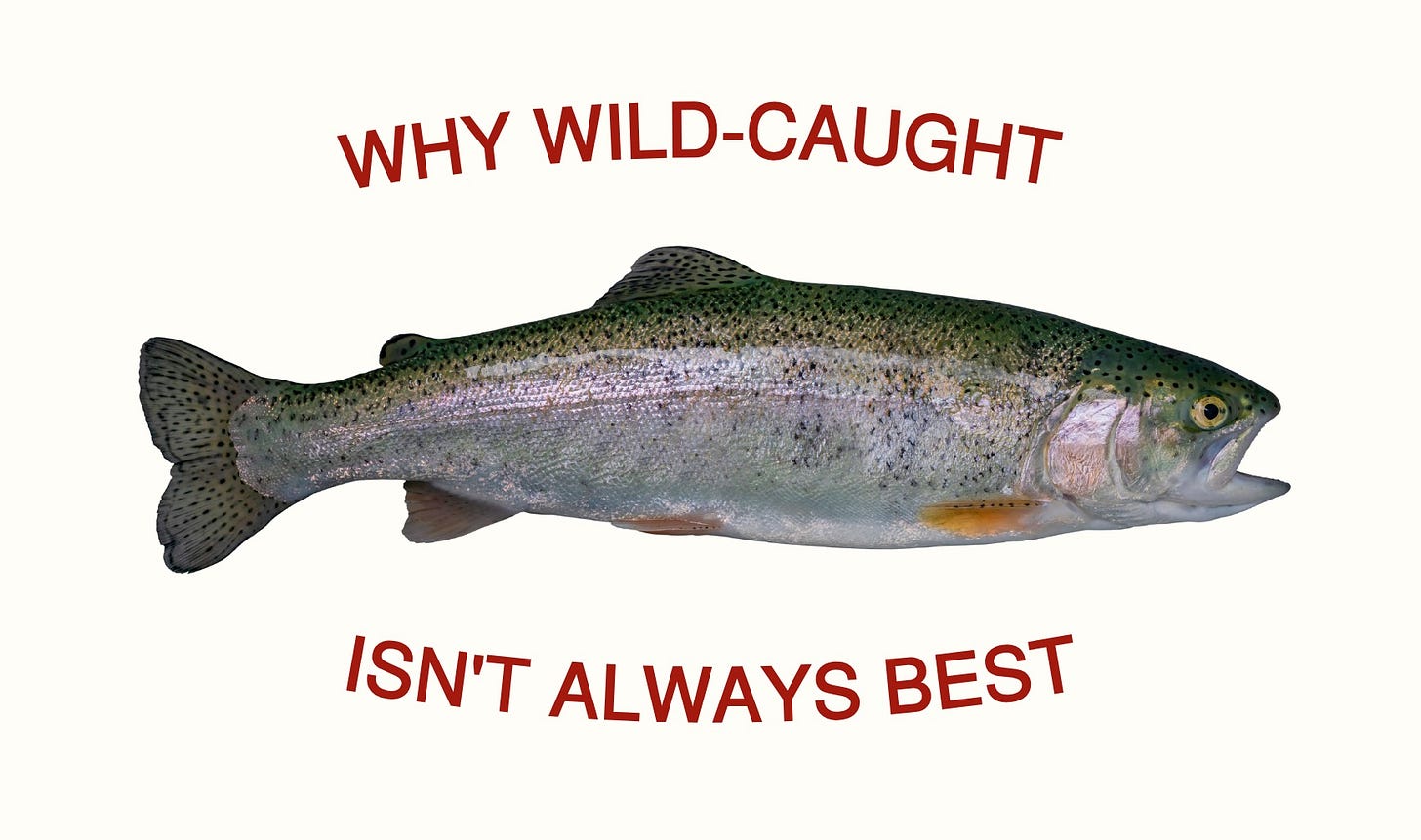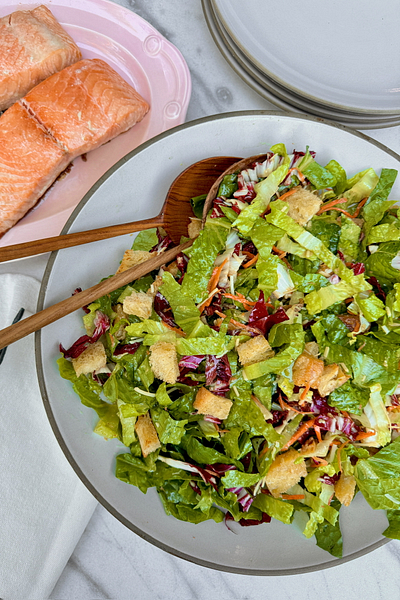Why “Wild-Caught” Isn’t Always Best
I'm all in on sustainably farmed salmon (& I have recipes for you, too) 🐟
Let’s be real—when most people hear “farmed salmon,” they picture overcrowded pens, unhealthy fish, and questionable environmental practices. And honestly? In many cases, they’re not wrong
.
Conventional salmon farming has earned its bad reputation for good reasons, like:
Overcrowded conditions that spread disease and stress the fish (usually not in the open ocean, but in inland tanks or pens)
Preventative antibiotic use to maximize output (medications are often added to the water even if the fish aren’t sick)
Poor-quality, grain-based feed that reduces omega-3 content and increases inflammatory omega-6s
Environmental damage from waste and habitat destruction
A lack of transparency around farming practices and standards
So yes—there are plenty of reasons to be cautious about farmed fish. But not all seafood farming looks like this. There’s a growing movement in aquaculture focused on sustainability, transparency, and nutrition. And that’s the kind of farmed salmon I’m excited about.
Many modern ocean farms—especially those with third-party certifications like ASC or Friend of the Sea—use zero antibiotics or synthetic chemicals. Instead, they focus on replicating the fish’s natural habitat with open-ocean farms that not only produce nutrient-rich seafood, but actually help restore the health of marine ecosystems.
So no, your fish doesn’t have to swim in medication. And yes, you can support aquaculture without compromising your health—or the planet’s.
Where to Find It
This all sounds great, but where can you actually find this quality of farmed seafood?
I’m a big fan of Seatopia—a certified-clean seafood delivery company providing sushi-grade, high quality, artisan farmed seafood (yes, that’s a thing) directly to your door. Think of it like your monthly CSA produce box, for but fresh, nutrient-rich seafood.
Their products are truly a cut above. Seatopia has completely changed the game for me with their consumer-friendly delivery system, strict sourcing standards—antibiotic-free, non-GMO, clean water, and nutrient-rich feed made with algae-based omega-3s, and absolutely delicious products from sushi-grade king salmon to yellowtail, branzino, Peruvian scallops, and the only smoked salmon my 5-year old son will eat. Seatopia even goes a step further by working with farmers who also raise kelp, mollusks, and crustaceans to help restore ocean ecosystems. And, they lab tests their products to ensure they are mercury safe and free from detectable microplastics (and they publish the results!).
Let’s take a deeper look into why these practices are important, how they affect your health and the environment’s. Plus, I’ve attached a fun recipe book at the end of this post with five of my favorite salmon dishes (so, keep reading!).
If you’re curious to sustainably farmed salmon, Seatopia is generously offering Btwn Meals readers 15 % off their order with the code MIA.
Nutrient Quality — Not All Fish Are Created Equal (Especially When It Comes to Omega-3s)
Here’s where things get interesting: sustainably farmed salmon can actually contain more omega-3s than both wild and conventionally farmed salmon. A 2018 study published in Lipids found that farmed salmon raised on high-quality, marine-based feed had significantly higher levels of EPA and DHA—the two omega-3s most critical for heart, brain, and hormone health, compared with wild salmon.
But the key here is what the salmon eats. Most conventionally farmed salmon doesn’t even come close to earning that gold star. Cheaper, grain-based feed (think: soy or corn) lowers omega-3 fatty acid content and raises omega-6 fatty acids—the inflammatory kind we’re already getting too much of.
With sustainably farmed salmon—like what Seatopia sources—you know the fish are raised in clean, deep water, in low-density environments (think 99% water, 1% fish), and fed a nutrient-dense diet optimized for omega-3s and free of environmental contaminants.
Toxins in Seafood — How to Safeguard Your Plate
In a world where the ocean is more polluted than ever, one of the biggest perks of sustainable farm-raised seafood is transparency. You know exactly how the fish was raised, what it ate, and what kind of conditions it lived in. That means less risk of microplastics, heavy metals, and other contaminants ending up on your plate.
Larger, wild fish like tuna and swordfish tend to accumulate more mercury and heavy metals. But smaller fish—like salmon, trout, mackerel, and anchovies—are naturally lower in toxins, especially when farmed in well-regulated waters.
Some companies go a step further. Seatopia, for example, tests all of its seafood for heavy metals and environmental toxins and publishes the results on each product page, so you know exactly what you’re getting (and what you’re not). That kind of transparency is rare—and makes a big difference if you’re trying to eat seafood more often without the toxic load.
Environmental Impact — Ocean Farms That Give Back
Not all seafood farming is destructive. When done right, it can actually be beneficial for the environment. Here’s how:

✔️ Habitat restoration – Ocean farms can create shelter and safe zones for marine life, like underwater gardens
✔️ Water filtration – Shellfish like oysters naturally clean and filter the water around them
✔️ Regenerative practices – Some farms go beyond sustainability and actively improve biodiversity and ocean health
So, Wild or Farmed?
The key isn’t just wild vs. farmed—it’s knowing where your fish is from, what it ate, and whether the farm is transparent about its practices. This is why I choose Seatopia every time. You can literally taste the difference, too.
Okay, now that we’ve establish the best salmon to buy, what are you going to do with it? Here is a recipe book with five of my favorite salmon dishes from our Sunday Meal Prep series. Please let me know what you make!
A big thank you to Seatopia for sponsoring this post and offering Btwn Meals readers 15% off their order—I can’t wait to hear what you think of their amazing seafood products!










